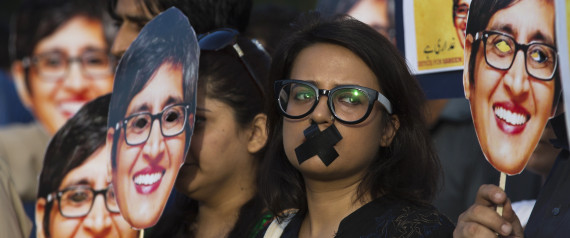Sabeen Mahmud, a social and human rights activist, was shot and killed in Karachi on 24 April. She was killed a few hours after hosting a discussion about the "disappeared people" of Balochistan. Her murder was meant as a warning to people daring to discuss the province. However, the history of Balochistan is a signal that it will not be silenced.
To understand why Sabeen Mahmud was killed, it is important to understand Balochistan. This is not a simple task. For one, there is an extreme paucity of honest, detailed, and consistent explanation about the politics, the diversity, the culture and the history of the place in the regular news cycle. Two, very little of what is said in the popular media within Pakistan can be trusted. News about the people, their actions, the situation on the ground, are all being clamped down upon, journalists are threatened into submission and the reportage is vividly coloured by what the ISI, the military and government choose to disclose. That being said, where regular media has failed, social media has proved to be extremely resourceful (and defiant) in piecing together the chaos and violence in the province.
The murder of Sabeen Mahmud follows almost a decade of extreme violence and political and social turbulence in Balochistan. The resource-rich province, lying on the southwest corner of Pakistan bordering Iran, serves as a palette for various forces to paint their stories.
First, one of the biggest threats to a peaceful Balochistan has been the complete and unscrupulous appropriation of its immense natural resources by the many governments and dictators of Pakistan. The negligible amount of compensation given to the Balochis, combined with the sidelining of their complaints and the dearth of any human resource development in the region has added up over the years.
Second, there are competing movements fighting for complete independence or greater autonomy for Balochistan.
Third, the movements, regardless of political leanings, have been targeted by the frontier corps, the military and the government in various ways including mass abduction, kill and dump policies, arrests and incarceration without trial or reason. The Voice of Missing Baloch Persons (VMBP) organization led by Mama Qadeer has been seeking justice for these missing people.
Fourth, the government under the aegis of Saudi Arabia has been instrumental in propagating more traditional forms of Islam, resulting in greater divisions along sectarian lines in what was once a diversely populated province. The sectarian crisis is being fanned by border conflicts with Iran. Iran has very little tolerance for the Sunni Balochs living in Sistan-Baluchistan (Iran), and the Pakistan government turns a blind eye to the Shia genocide. The resulting tension has impacted politics within Balochistan
Fifth, the separatist movements that pit themselves against the Pakistan government have also been solicited by terrorist outfits operating around the Khyber-Pukhtunkhawa regions and across the border in Afghanistan. The Zarb-e-Azb operation by Pakistan in the northwest has resulted in many of the terrorists escaping to Afghanistan and/or finding refuge in Balochistan.
Sixth, the militant wing of government-approved outfit Sipah-e-Sahaba has been at the forefront of instigating the ongoing genocide against Shia Muslims.
All these problems have come sharply into focus in various ways since the beginning of this year.
" Sabeen Mahmud's murder is at once singularly symbolic and a sum of all the actions against a beleaguered people... It will prove to be much more difficult to silence an entire province now."
Pakistan doesn't view the Baloch separatist or independence movements very kindly and has labelled many of them as terrorist outfits. The greater authority given to the military courts and the hurried sentencing of alleged terrorists, without proper trials, has struck fear in the province. There have also been bigger, more public attacks on minorities and minority institutions in the province since January 2015.
Over the last two months, a series of events internally and externally has created a tinderbox situation with far-reaching consequences for the people of Balochistan.
The extension of the Zarb-e-Azb operations into Balochistan under the aegis of a brutal military which is not under the control of any civilian government or answerable to civil society has begun. The military has shown itself to be incapable of or not willing to differentiate between terrorists targeting the state and a people who are fighting the terrors unleashed by the state.
Repression by the state will guarantee an equally violent reaction from those who are fighting for their land, rights and families. A vicious circle of violence and counter-violence will ultimately suck in vested groups to fish in troubled waters. The Turbat incident, where 20 laborers from other provinces were killed by separatists in a region of Balochistan, is just one indication of this.
The surrendering of land and resources to a foreign power by people who do not belong to Balochistan will also cause resentment against the rest of Pakistan as well as the foreign power. If the economic corridor agreement between China and Pakistandoes not address the concerns of the Balochis or involve them in the process will only increase the grievances of the people in the province. This coupled with the stationing of 10,000 additional troops to protect the workers will increase tensions in Balochistan.
Sabeen Mahmud's murder is at once singularly symbolic and a sum of all the actions against a beleaguered people. Her initiation of and presence at the discussion "Unsilencing Balochistan", was the sole reason for her death. It will prove to be much more difficult to silence an entire province now.

No comments:
Post a Comment